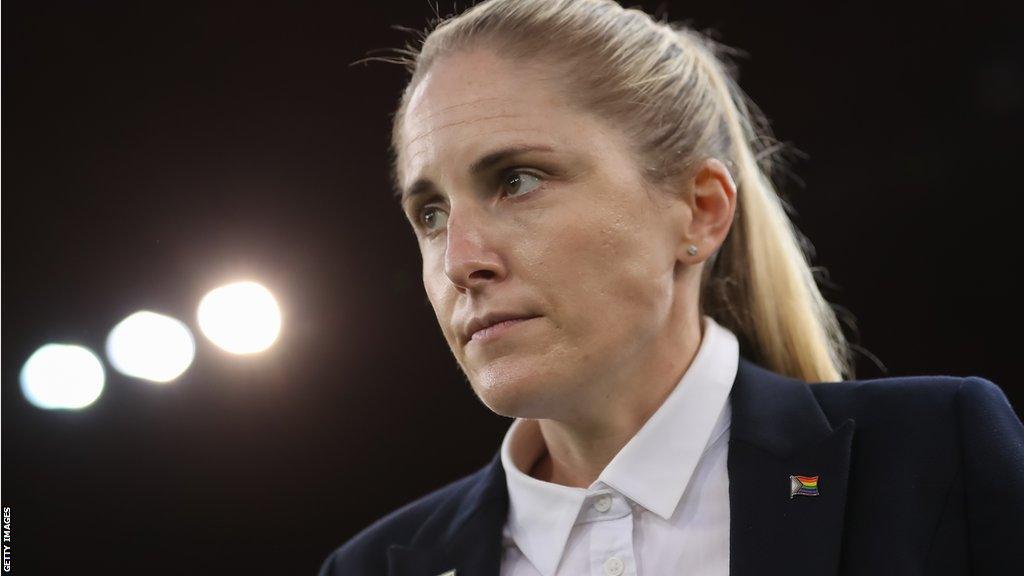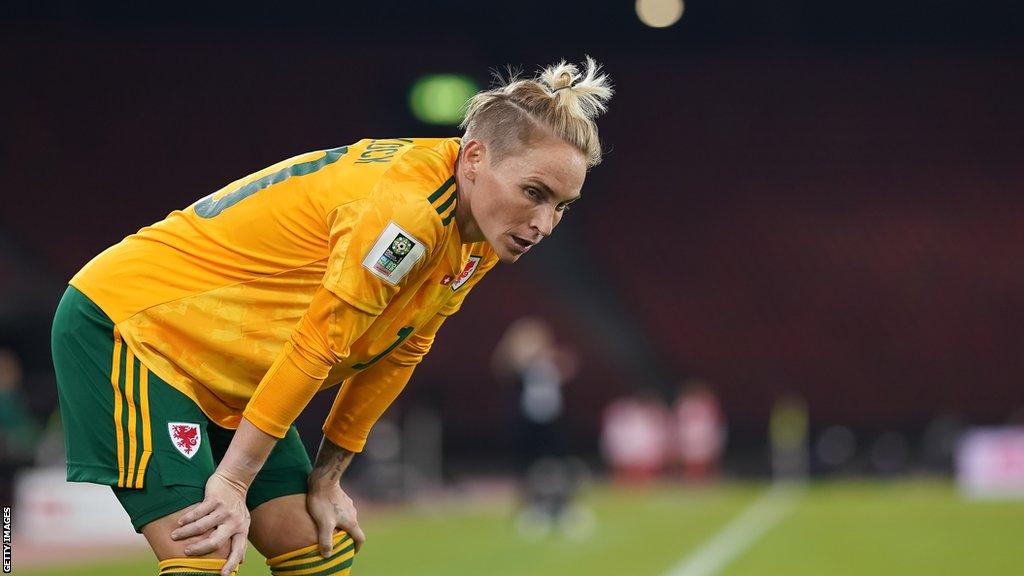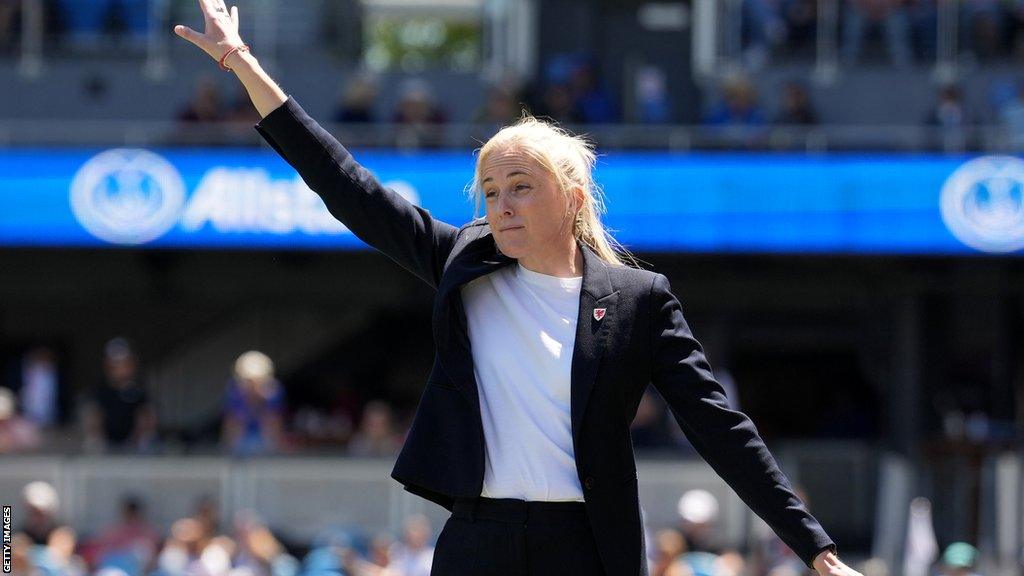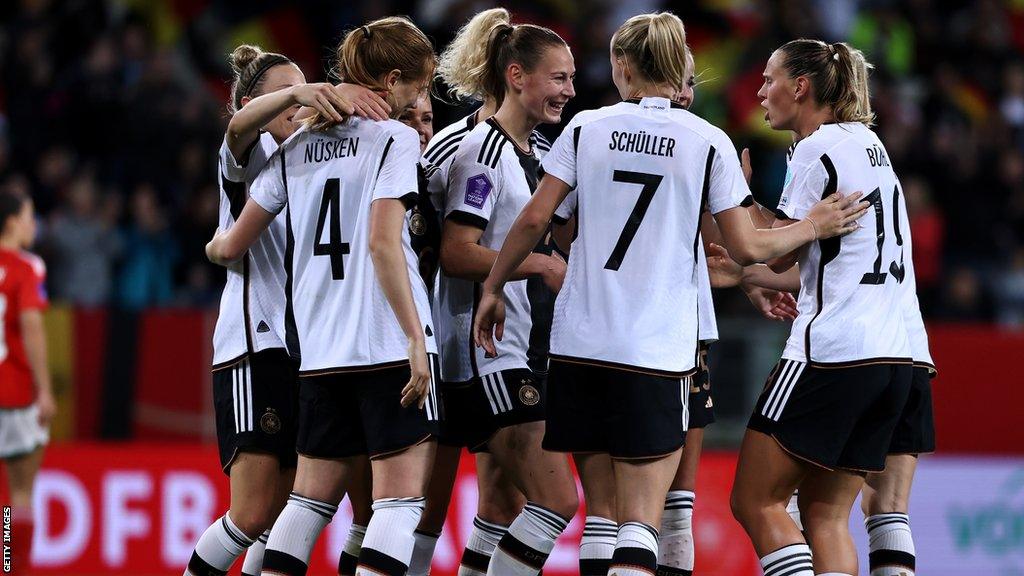Progress, heartache and frustration - Gemma Grainger's Wales tenure reviewed
- Published
- comments

Gemma Grainger had spells with Leeds United, Middlesbrough and England prior to her role with Wales
Welsh football finds itself in the midst of another managerial search following Gemma Grainger's departure.
The 41-year-old left her post as Wales boss on 10 January to take up a role with former Olympic, European and world champions Norway.
But how will Grainger's time in Wales be remembered?
Here is a look at the highs and the lows of the departed manager's tenure as Wales manager.
Experimentation - and a flying start
Having signed a four-year contract with the Football Association of Wales (FAW) in March 2021, Grainger was afforded the chance to oversee three friendlies prior to her maiden World Cup qualification campaign.
Defeats by Canada and Scotland came either side of a creditable draw against Denmark, but qualifying started in dream fashion.
An emphatic 6-0 triumph over Kazakhstan was followed by a gritty 1-0 victory in Estonia - handing Grainger a 100% winning start as the Red Wall started to dream.
Grainger's players showed a real fighting spirit to earn a 1-1 draw away to Slovenia in what was the women's side's 200th official fixture, with Kayleigh Green sent off minutes after netting.
Wales' transition under Grainger was proving fruitful, and a record crowd of 5,455 turned out to watch Angharad James, Helen Ward, Natasha Harding and Sophie Ingle net in a 4-0 rout of Estonia at Cardiff City Stadium.
A 5-0 thrashing of Greece at Llanelli's Parc y Scarlets gave Wales real belief that they could end 2021 on a high by surprising a strong France side in Guingamp.
By this point, the likes of Carrie Jones and Esther Morgan were being gently integrated into the squad while stalwarts including Ingle, James and Jess Fishlock continued to play pivotal roles.
Despite falling behind to Kadidiatou Diani's first-half goal, Wales - who again had striker Green sent off - came within inches of claiming a point as Fishlock struck the post, only for Selma Bacha to net for the hosts from the resulting counter-attack.
Nevertheless, Wales entered 2022 in great spirits, and the Pinatar Cup in February again gave Grainger a chance to assess her squad.
A 3-1 success against Scotland was followed by a penalty shootout defeat to Belgium and a 1-0 loss to Ireland, but the real business resumed in April.
France were now the visitors to Llanelli, and Wendie Renard put Les Bleus before Marie-Antoinette Katoto capitalised on Laura O'Sullivan's blunder to put the away side in command.
Wales rallied and pulled a goal back through Ingle, although their efforts came too little too late, while still offering hope.
Grainger's side were nothing short of resolute after that setback and kept three successive clean sheets to end their qualifying campaign.
Kazakhstan were comfortably dispatched 3-0 while a 1-0 win in Greece ensured Wales needed just a point from their final qualifier against Slovenia to reach the play-offs.
A fresh record crowd of 12,741 attended as Grainger's side earned a 0-0 draw in the Welsh capital to book their place in the World Cup play-offs for the first time.
That record tally was beaten again when 15,200 fans watched Fishlock net an extra-time winner as Wales - who had four goals ruled out for offside - defeated Bosnia & Herzegovina in the semi-finals.

Jess Fishlock cuts a dejected figure as Wales are agonisingly beaten in Switzerland
Heartbreak, and a missed opportunity?
Wales headed to Switzerland on 11 October, 2022 as firm underdogs, although Rhiannon Roberts' early goal put Grainger's side on course for a shock result.
However, after Ramona Bachmann scored in the final stages of the first half, Fabienne Humm secured a deserved victory for the hosts deep in extra time.
The game was particularly notable for Wales' style shift, with a significantly more direct and defensive approach being adopted in Zurich.
"We have to keep compact but when we win the ball back we have to do better with the ball," said former Wales midfielder Katie Sherwood during BBC Two Wales' match coverage.
"We can't just be lobbing it forward, we have to be cleverer with the ball."
The inevitable post-mortem followed, although there was real pride in what Wales had achieved in progressing so far in qualifying.
"This team has already created history getting to this stage," said ex-Wales defender Danny Gabbidon.
Former Wales forward Gwennan Harries added: "This is absolutely heartbreaking. We got so close, but you do have to look at the bigger picture.
"Wales had 15,000 on Thursday evening. The development of the game has been outstanding and it's such a shame it won't be rewarded with an historic first major tournament."

Former Wales boss Gemma Grainger looks on during her side's 2-0 defeat to the USA
An historical change
With no competitive action scheduled until the inaugural women's Nations League campaign in September, 2023 proved to be a testing year for Wales and Grainger in particular.
But FAW chiefs had been sufficiently impressed with Wales' progress under Grainger to award the manager a two-year contract extension.
"I'm delighted to have signed a new contract and to extend my journey working with this special group of players," said Grainger in January 2023.
"I'm an ambitious coach, these players are ambitious and the FAW are ambitious, so all those things are a great match."
And only nine days later came an historical change that would dramatically alter the landscape of women's football across the country.
The FAW announced it had reached an agreement with Wales' men's and women's sides to achieve equal pay.
FAW chief executive Noel Mooney said: "The FAW is a modern, progressive movement that seeks to improve each day.
"This is another step towards becoming one of the world's great sports organisations and we thank both the men's and women's squads for their brilliant co-operation in getting this agreed."

Wales were put to the sword by Germany in Sinsheim
Raised expectations, increased pressure
A six-game unbeaten run followed the gut-wrenching Switzerland defeat, with the highlight being a 4-1 success against Northern Ireland in Cardiff.
But the second half of 2023 saw Grainger navigate stormy waters as Wales desperately struggled against quality opposition.
Despite the absence of stars including captain Ingle and taliswoman Fishlock, Wales frustrated four-time World Cup winners USA for long periods before Trinity Rodman's late double earned the hosts victory in a San Jose friendly.
However, it was the subsequent Nations League campaign where public opinion on Grainger's Wales started to shift.
There was an acceptance that Wales were facing high-level opposition in Denmark, Germany and Iceland in League A, although Grainger was heavily criticised during stages of the competition.
One of the key gripes aimed at the manager was her unwillingness to make substitutions earlier, while others criticised the lack of game-time given to youngsters including Ffion Morgan, Ella Powell and Elise Hughes.
Despite a spirited display, a lack of ruthlessness in the final third cost Wales as they opened their campaign with a 1-0 loss to Iceland before suffering miserable 5-1 defeats by Denmark and Germany.
Following defeat by the Germans, ex-Wales player Kath Morgan said: "When we play against a team who have been there, done it, won World Cups, we are nowhere near their level to compete.
"This is not being derogatory to our national team, that is the reality.
"It's like Merthyr playing Manchester City, the gulf between European teams who have been invested in by their associations for 30 years [and the rest]. We have to accept where we are."
Former Wales goalkeeper Jo Price even hinted that the FAW should explore the option of replacing Grainger as boss.
"Two 5-1 defeats, I'm looking at what changes can be made and I'm not just thinking tactically, I'm thinking maybe a new manager," she said in October.
A late rally in Denmark was not enough as Wales - who saw Fishlock get on the scoresheet - were beaten 2-1 by the Danes, leaving Grainger's side staring down the barrel of a pointless campaign.
Their attacking woes came back to haunt them in Cardiff as Iceland left the capital with a 2-1 victory that guaranteed Wales would be relegated into League B.
There was real concern ahead of the campaign's climax against Germany, although Wales produced their best display to earn a highly creditable 0-0 draw in Swansea.
It was undoubtedly a case of too little, too late, although the ending to what was a grim campaign did at least provide a glimmer of hope before this year's Euro qualifiers.
Nevertheless, Grainger stuck to her assessment that playing stellar opposition on a regular basis would only boost Wales' chances of qualifying for a major tournament for the first time.
A bombshell exit
Grainger's Wales departure was unexpected to say the least.
"An absolute shock for me," said former Wales player Nia Jones. Her sentiments were echoed across the Welsh women's game.
Though Grainger ended her reign with an eight-match winless streak, the fact Norway came calling for her services proves the FAW had a talent on their hands.
Ultimately, the FAW now have to return to the drawing board before Wales' Euro 2025 qualifying campaign.
It may well feel like a case of what could have been regarding Grainger.
While the ending was frustrating, there were certainly plenty of promising signs that Wales were starting to close the chasm to those above them.

PARANORMAL: Chilling ghost stories and words appearing on the walls...
STEELTOWN MURDERS: Three murders - unsolved but never forgotten
